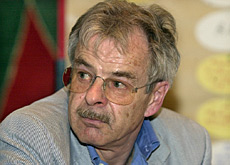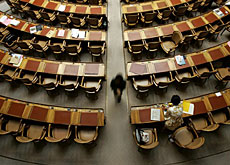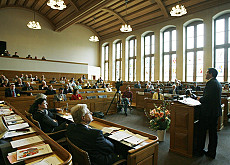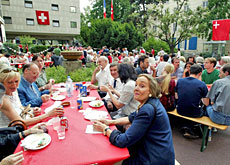Ballot box option attracts Swiss expats

Expatriates have been showing an increasing interest in Swiss politics over the past 15 years, political scientist Wolf Linder tells swissinfo.
More than 110,000 Swiss living abroad are expected to cast their vote in October’s parliamentary election – the highest number ever.
Linder, who is director of Bern University’s political science institute, has explored the possibilities of giving the Swiss abroad a greater say in politics in Switzerland as they could offer a different perspective.
The Swiss abroad were granted voting rights in 1992.
swissinfo: In 1992 there were 15,000 registered voters. Now, the number has risen to more than 110,000 for the October ballot. How do you explain this increased interest in Swiss politics?
Wolf Linder: There are several reasons. For one, it seems that the right to vote for Swiss living abroad is something they want. Some of them have only recently found out that they can take part actively in political life in Switzerland.
Organisations of Swiss abroad have also stepped up efforts to provide more information and encouraged citizens to participate.
swissinfo: In some cases, Swiss abroad can also vote in cantonal elections. Is this a positive development?
W.L.: This can be done in ten out of the country’s 26 cantons and is apparently the trend. But I think it is much more important for the Swiss abroad to take part in ballots at the federal level.
For somebody living in New York or Sydney, national politics is of more interest than, for example, proposals to build a school extension in a town or village.
swissinfo: It is said that the votes of the Swiss abroad can tip the scales in certain ballots.
W.L.: There is no proof of that. The more than 110,000 Swiss abroad admittedly have considerable potential. They are the equivalent to a middle-sized canton. But the votes are spread over all the cantons and therefore lose impact.
And here lies the problem: the voters’ potential is drained away with the current situation.
For this reason there are efforts to group these votes. They would be more visible and have more muscle.
The Swiss abroad could, for instance, have seats in the House of Representatives and Senate allocated to them.

More
House of Representatives
swissinfo: So we will effectively have an additional canton?
W.L.: I wouldn’t say so. But you could have two seats in the Senate and a special allocation of five, eight or ten seats in the House of Representatives.
This is common in other countries, such as Italy.
swissinfo: How realistic is such a request?
W.L.: Probably not very realistic at present. A majority of voters and cantons would have to agree to such a major change in the constitution.
Such a proposal would also have to be very balanced so as not to create antagonism.
swissinfo: Are Swiss parties taking any notice of their constituency abroad?
W.L.: It’s crucial for the parties to boost their profile abroad. But their financial resources are limited. The parties are to a large extent not run as professional organisations but depend on volunteers.

More
Canton
swissinfo: Research has shown that Swiss abroad have a different opinion from the average person at home.
W.L.: That’s true. They are more vocal especially in foreign policy issues, more liberal when it comes to business issues and more social in social matters.
But they voted for stricter asylum regulations than their compatriots in Switzerland.
swissinfo: Do Swiss abroad have different political needs and desires from people at home?
W.L.: No. But they tend to look at Switzerland from a different perspective.
The vote of the Swiss living abroad can be important and worthwhile as we can receive feedback on how we look from the outside. Sometimes we can’t see the wood for the trees.
swissinfo-interview: Etienne Strebel
1992: 15,000 voters
2006: 111,249 voters
The 2006 figure represents 22.5% of eligible Swiss voters living abroad.
This is 2% of all Swiss who are of voting age.
At the end of December 2006, 645,010 Swiss nationals were living abroad. Just over 70% of them held dual citizenship. Three in five lived in EU countries.
The Swiss abroad are known as the “Fifth Switzerland”. The other four are the country’s four linguistic areas.
EU – 389,732 (60.4%)
· France (171,732)
· Germany (72,384)
· Italy (47,012)
· Britain (27,326)
· Spain (22,680)
· Austria (13,380)
Outside the EU
· United States (71,984)
· Canada (36,374)
· Australia (21,291)
· Argentina (15,061)
· Brazil (13,956)
· Israel (12,011)
· South Africa (8,821)

In compliance with the JTI standards
More: SWI swissinfo.ch certified by the Journalism Trust Initiative



You can find an overview of ongoing debates with our journalists here. Please join us!
If you want to start a conversation about a topic raised in this article or want to report factual errors, email us at english@swissinfo.ch.